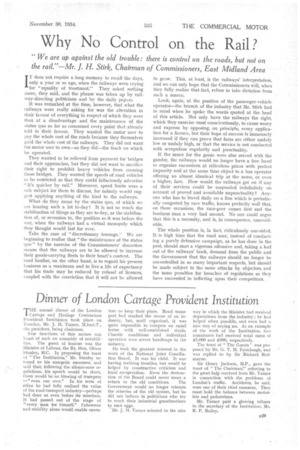Why No Control on the Rail? • " We are up
Page 47

If you've noticed an error in this article please click here to report it so we can fix it.
against the old trouble: there is control on the roads, but not on the rail."—Mr. J. H. Stirk, Chairman of Commissioners, East Midland Area IT does not require a long memory to recall the days, only a year or so ago, when the railways were crying for "equality of treatment." They asked nothing more, they said, and the phrase was taken up by railway-directing politicians and by the daily papers.
It was remarked at the time, however, that what the railways were really asking for was the alteration in their favour of everything in respect of which they were then at a disadvantage and the maintenance of the status quo so far as concerned every point that already told in their favour. They wanted the motor user to pay the whole cost of the roads beca.use they themselves paid the whole cost of the railways. They did not want the motor user to own—as they did—the track on which he operated.
They wanted to be relieved from payment for bridges and their approaches, but they did not want to sacrifice their right to prohibit heavy vehicles from crossing those bridges. They wanted the speeds of road vehicles to be restricted so that they could fallaciously advertise "It's quicker by rail." Moreover, speed limits were a safe subject for them to discuss, for nobody would suggest applying anything of the kind to the railways.
What do they mean by the status quo, of which we are hearing such a lot to-day? It is not so much the stabilization of things as they are to-clay, as the stabilization of, or reversion to, the position as it was before the war, when the railways had a virtual monopoly which they thought would last for ever.
Take the case of "discretionary tonnage." We are beginning to realize that "the maintenance of the status quo" by the exercise of the Commissioners' discretion means that the railways are to be allowed to increase their goods-carrying fleets to their heart's content. The road haulier, on the other hand, is to regard his present business as a maximum and to live a life of expectancy that his trade may be reduced by refusal of licences, coupled with the conviction that it will not be allowed to grow. This, at least, is the railways' interpretation, and we can only hope that the Commissioners will, when they fully realize that fact, refuse to take dictation from such a source.
Look, again, at the position of the passenger-vehicle operator—the branch of the industry that Mr. Stirk had in mind when he spoke the words quoted at the head of this article. Not only have the railways the right, which they exercise most conscientiously, to cause worry and expense by opposing, on principle, every application for a licence, but their hope of success is immensely increased if they can prove that fares are either unduly low or unduly high, or that the service is not conducted with scrupulous regularity and punctuality.
If the sauce for the goose were also served with the gander, the railways would no longer have a free hand to organize excursions at ridiculous prices with perfect impunity and at the same time object to a bus operator offering an almost identical trip at the same, or even a higher, fare. How would the railways get on if any of their services could be suspended indefinitely on account of proved and avoidable unpanctuality? Anyone who has to travel daily on a line which is periodically congested by race traffic, knows perfectly well that, on these occasions, the race-goer comes first and the business man a very bad second. No one could argue that this is a necessity, and is, in consequence, unavoidable.
The whole position is, in fact, ridiculously one-sided. It is high time that the road user, instead of conducting a purely defensive campaign, as he has done in the past, should start a vigorous offensive and, taking a leaf out of the railways' book, demand from the public and the Government that the railways should no longer be uncontrolled in so many important respects, but should be made subject to the same attacks by objectors and the same penalties for breaches of regulations as they have succeeded in inflicting upon their competitors.




































































































